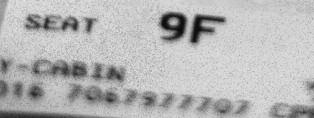

Lost in the digital warehouse
Straightening some files the other day, I found a letter my father sent in 1984. While cleaning his desk, he'd found a letter from a friend of his father. It included some notes the man had written in 1969, upon the death of my grandfather, found while tidying up his papers. So here it was, something that had been interesting enough that three times it had survived the process of desk cleaning, and been passed on. What was I doing with all this paper? Scanning it.
Scanning files has let me clear an awful lot of stuff from my office. I'm satisfied knowing that it's searchable, indexed, and backed up. I can find, forward, edit and reorganize the scanned archive. But I wonder - will anyone ever stumble upon these notes about my grandfather again? For anyone but me to do so requires software, a password, and access to my files. For the documents to survive, my backups have to work, and Adobe formats have to remain readable on future computers. Such hurdles doom many files to obscurity - but others pop up in ways they never would in a paper world. For example, the old documents that appear when I search for recent ones, or the Shanahans and Shillings whose names appear, briefly, when I begin to search for my son's phone number.
When compact discs were new, their cost premium (over their vinyl counterparts) drove many buyers away. But though their marginal cost was high, mastering a disc was much cheaper than cutting a vinyl master. Plus, the discs were smaller, so more of them fit in a store. Obscure artists, old recordings, and alternate versions were all easier to make, and to find. Today, digital readers are doing the same for books, and treasures like the early writings of John D. MacDonald are back in use, if not in actual print.
The balance between permanence and access, between usability and reliability, continues to shift. Hyundai's new Equus luxury sedan includes an iPad that contains its owner's manual. Flashy, and probably quite usable. Yet the image of a rainy night and a flat tire in the middle of nowhere makes one yearn for a ratty paper booklet wedged in the back of a glovebox, instead of a glass tablet with a dead battery. Hyundai apparently believes that smart maintenance scheduling and good marketing trump the absolute reliability of a book that is seldom, if ever, used.
On a larger scale, the same is true. Corporate and facility disaster planning tools like Preparis are entirely online, delivered through browsers, PDAs, and apps. This is a far cry from the emergency envelopes that Slim Pickens handed out in Doctor Strangelove. It's easy to imagine disasters where computers won't work - it's even easy to remember them. Yet my corporate disaster planning guru insists "disaster planning is too complex not to use computers." He counts on CDs, thumb drives, laptop batteries and severely redundant systems to get people the information they need in a pinch.
As paper enters its final stage, as an ephemeral medium for reading and editing by old people, and everything else becomes digital, we will need a conscious effort to preserve our private browsing grounds. Cloud-based family archives, personal searchable dogpiles, and other forms of digital surrender may help, but they won't cover everything. Accidental treasures may disappear in perfect digital warehouses, lost forever because we made them so findable.
Copyright 2011 - Noah Shlaes